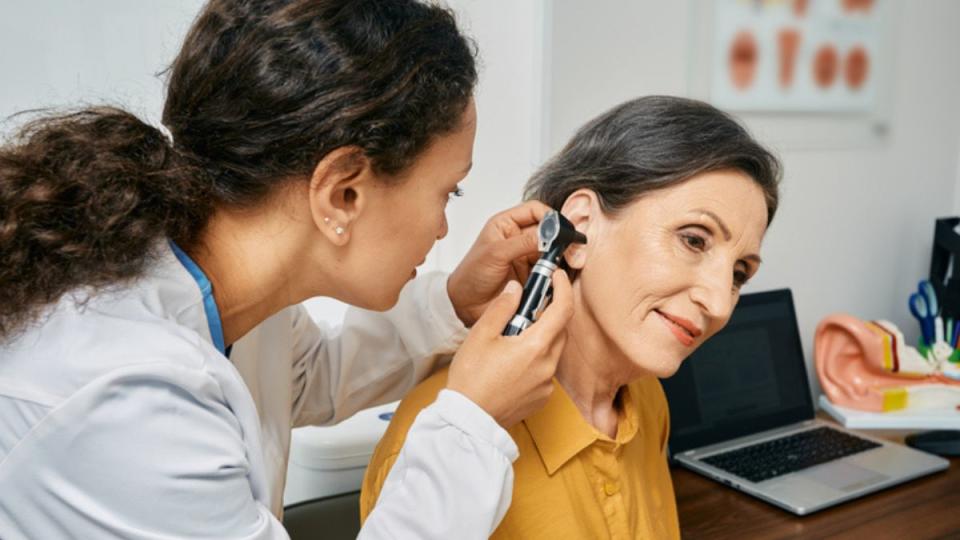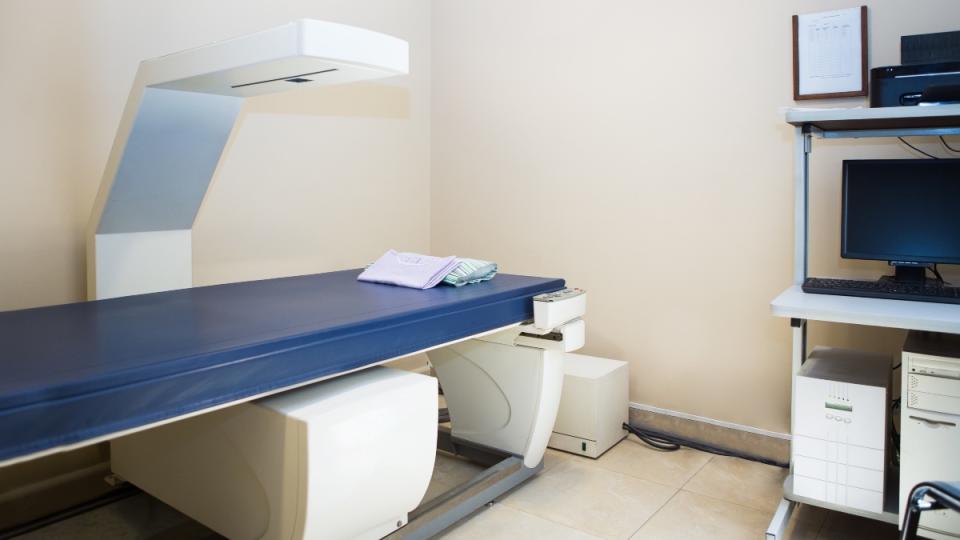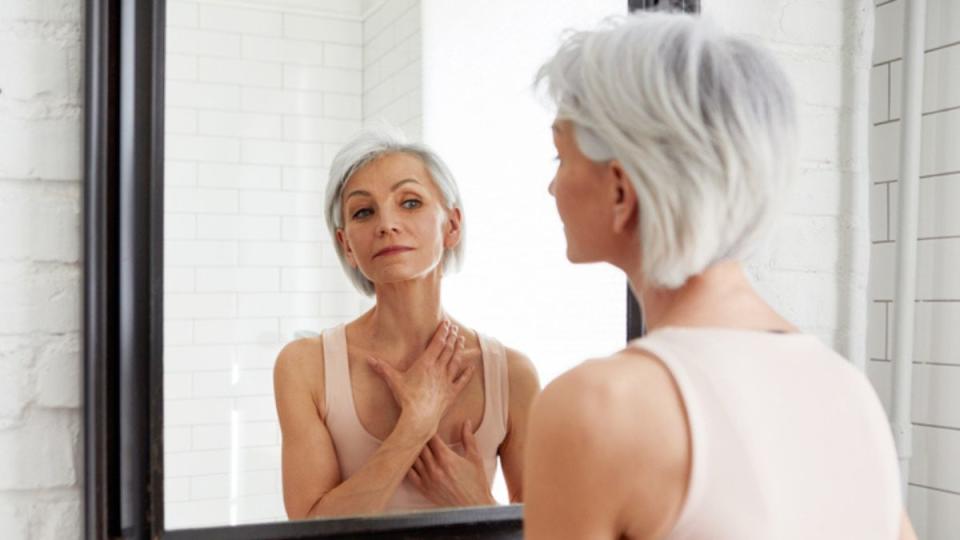These Are the 4 Overlooked Health Screening Tests Doctors Say Women Over 50 Shouldn’t Skip
Sure, you know the importance of having a routine colonoscopy, mammogram and Pap smear. But it turns out there are some key health screening tests that often go under the radar. It may not seem like a big deal, but skipping them could be keeping you in the dark about your health.
Here’s the 4 health screening tests doctors suggest having, why they’re important and how they can make a world of difference. The best part? Some you can do in the comfort of your own home — no doctor’s visit required!
1. Health screening: Hearing test
Primary care doctors don’t typically screen patients for hearing and may not even ask about it. In fact, a University of Michigan poll found 80% of Americans over 50 say their primary care doctor hasn’t asked about their hearing in the past two years. And nearly as many (77%) haven’t had their hearing checked by a professional in that same time.

Sometimes, people may not even realize how much their hearing has dimmed. And if they do, they don’t think it’s worth mentioning to their doctor. But why is a hearing health screening so important? “If you’re not hearing well, you’re not fully engaged and can miss out on important conversations and instructions from your physicians,” says Susan Klugman, MD, a professor of obstetrics and gynecology, women’s health and pediatrics at Montefiore Health System and Albert Einstein College of Medicine in Bronx, New York.
Hearing loss can also lead to depression, social isolation and loneliness, plus impair your memory and thinking abilities. It can also cause walking and balance issues (it's been linked to an increased risk of falling), migraines, dizziness and fatigue.
How to test your hearing at home
It’s recommended people 50 and older have their hearing tested every 1 to 3 years, with a baseline screening at age 50. You can have your hearing tested by an audiologist or other hearing professional. Or you can do an at-home health screening with one of three free hearing test apps: Jacoti, Mimi and SonicCloud.
The apps play a series of tones and ask you to match the lowest level you can hear. Once you’re done, you’ll get your hearing number. This indicates how loud speech needs to be for you to hear it (the lower the number, the better your hearing).
A hearing number between 20 to 34 indicate mild hearing loss, and moderate hearing loss falls between 35 and 49. If you have a score of 50 and up, your hearing loss is considered more severe. In that case, you’ll want to schedule a visit with an audiologist.
Post-health screening tip
Got a score indicating you’re in the mild hearing loss range? Try doing some slow, gentle yoga poses such as downward facing dog, forward fold, triangle pose or cobra. These moves can increase the blood and oxygen supply to the inner ear, which may help sharpen your hearing. Check out the video below for a visual how-to.
Related: MD-Approved Tricks to Sharpen Hearing Naturally — No Hearing Aid Required
2. Health screening: Bone density test
A bone density, or DEXA scan, is an X-ray showing the strength and thickness (density) of your bones to check for osteoporosis, says Olivia Yost, MD, a family and integrative medicine physician at the University of Michigan Health-West in Caledonia, MI. “It’s typically recommended at 65," she notes. "But if you have a strong family history, have been on certain medications for a long time, like steroids, or have an autoimmune disease such as long-standing thyroid disease, it’s a good idea to have this test sooner.”
Emily Tuchman, MD, an internal medicine physician with Northwestern Medicine Glenview Outpatient Center in Glenview, IL agrees, adding that women with a history of fracturing or breaking a bone caused by a low-impact injury and women who are smokers or are underweight should also have an initial DEXA scan before 65. “If that scan is normal, we’ll repeat it in five years," she says. "But if it’s abnormal, showing osteopenia or osteoporosis, we’ll have the patient get another scan in two years."
There’s also a benefit of having this health screening after menopause, adds Dr. Klugman. “At menopause, when estrogen levels decrease dramatically, bone density plummets rapidly," she says. "It’s good to know your baseline [score].”
How a DEXA health screening works
A bone density scan is painless and typically takes less than 15 minutes. You lie on a soft table while the X-ray scanner passes over your hip and lower spine. The results, given in the form of a T-score, will show if your bone density is in the normal range or if you have some bone loss, which ups your fracture risk.

ruizluquepaz/Getty
The best T-score is 0, which is the bone mineral density of a healthy young adult. If your T-score is -1 or higher, your bone density is healthy. But if it’s falls between -1 to -2.5 or lower, you have an increased likelihood of breaking a bone.
Related: Doctor’s Best Natural Ways to Strengthen Bones So You Avoid Osteoporosis Drugs
Post-health screening tip
If your DEXA scan reveals bone loss, be sure you’re getting at least 1,200 mg of calcium a day, says Dr. Tuchman. Foods rich in calcium include yogurt, milk, cheese, kale, seafood, oranges, almonds and white beans, Dr. Tuchman says. (See more of the best foods to prevent bone loss.)
“It’s best to get smaller amounts throughout the day rather than all the calcium at one time [with a supplement] because it allows for better absorption,” she explains. Also smart: Getting 2,000 IUs of Vitamin D a day and doing weight-bearing exercises, which are important for improving overall bone health and strength, adds Dr. Tuchman.
3. Health screening: Skin check
Although more women over 50 are getting a health screening for skin cancer because primary care physicians are more aware of the necessity of skin checks, there are still some women who aren’t getting checked, says Justin Haught, MD, a clinical associate professor of dermatology at Virginia Commonwealth University in Richmond, VA.
“Most women should receive a yearly full-body skin exam every year starting at age 50,” says Dr. Haught. “However, their recommended starting age may decrease based on various factors such as skin type, lifetime sun exposure and family history.”

How to do a skin check at home
While waiting for an appointment, you can check for any new spots and changes in the appearance of moles. Simply examine your body in a full-length mirror and use a hand mirror to check your scalp, back and buttocks. “It can be challenging to see things on the back of the body, so having a spouse, friend or family member look for you can make the process easier,” says Dr. Haught. That person can also take photos of the areas you can’t see easily so you can zoom in for a closer look.
Spot something suspicious but can’t get to the doctor right away? Try scheduling a telehealth appointment or ask if you can email, text or upload the photos through your doctor's healthcare portals for evaluation, says Dr. Haught. Chances are, they’ll be able to look at the images and let you know if there’s cause for concern.
For more tips on how to do a self check, Dr. Haught recommends the video below. You can also go to the American Academy of Dermatology's website to see what to look for.
Post-health screening tip
To ward off skin cancer, protect is key. “I recommend a broad spectrum sunscreen with a SFP of 30 for daily moisturizers and light sun exposure," says Dr. Haught. "But for activities that involve water or sweat, such as swimming or exercising outdoors, use a SPF of at least 50. On paper there isn’t a big difference between a 30 and 50 SPF. But in real-world usage, there is a larger difference attributed to uneven sunscreen application and thinning from water or sweat.”
4. Health screening: Lung test
It’s great to have kicked a smoking habit all those years ago. But it turns out your lungs may still need a checkup even if you no longer smoke. Why? Even though your lungs start healing and repairing when you quit, some of the damage from smoking may be permanent. This can make you more vulnerable to developing lung cancer, which often doesn’t show symptoms until it’s in the later stages.
How to get a lung test
A lung health screening test is essentially a detailed X-ray of the lungs. It's called low-dose computed tomography, or a low-dose CT scan, and it can be a lifesaver. An Icahn School of Medicine study found more than 80% of people whose lung cancer was caught early through the screening were still alive after 20 years.
Unfortunately, a report by the American Lung Association found only 5.8% of Americans had been screened for lung cancer. And in some states, rates were as low as 1%. “A lot of people aren’t aware of lung cancer screenings and who meets the criteria for it,” says Dr. Yost.
So who should get tested? It’s recommended adults age 50 to 80 who have a 20 pack-a-year smoking history, currently smoke or quit within the past 15 years have an annual lung health screening. But non-smokers may benefit, too, especially those exposed to secondhand smoke.
Tip: Be honest with your doctor about your smoking history. “Don’t be ashamed or embarrassed, we’re not looking to shame or scold you,” says Dr. Yost. “Rather, we want to make sure you’re getting the best care and it’s gives us an opportunity to discuss your health goals.”
Not sure you’re a candidate? You can gauge your lung cancer risk and eligibility for a health screening with this quiz created by the American Lung Association.
Post-health screening tip
Getting 30 minutes of aerobic exercise 4 to 5 days a week is one of the most effective ways to improve lung health. But there are other ways to protect your lungs too, says Dr. Tuchman. She suggests keeping up-to-date with flu, COVID and pneumonia vaccines to prevent lung infections, wearing a mask when necessary to avoid exposure to pollution, smoke or dust and practicing diaphragmatic breathing, which can make lungs operate more efficiently. The American Lung Association’s deep belly breathing video can get you started.
For more ways to clue into your health and ward off trouble:
Is Falling Asleep After Eating a Sign of Diabetes? It Can Be — Here’s How To Tell
The Sneaky Silent Stroke Symptoms Doctors Want Women to Know + How to Cut Your Risk
This content is not a substitute for professional medical advice or diagnosis. Always consult your physician before pursuing any treatment plan.

